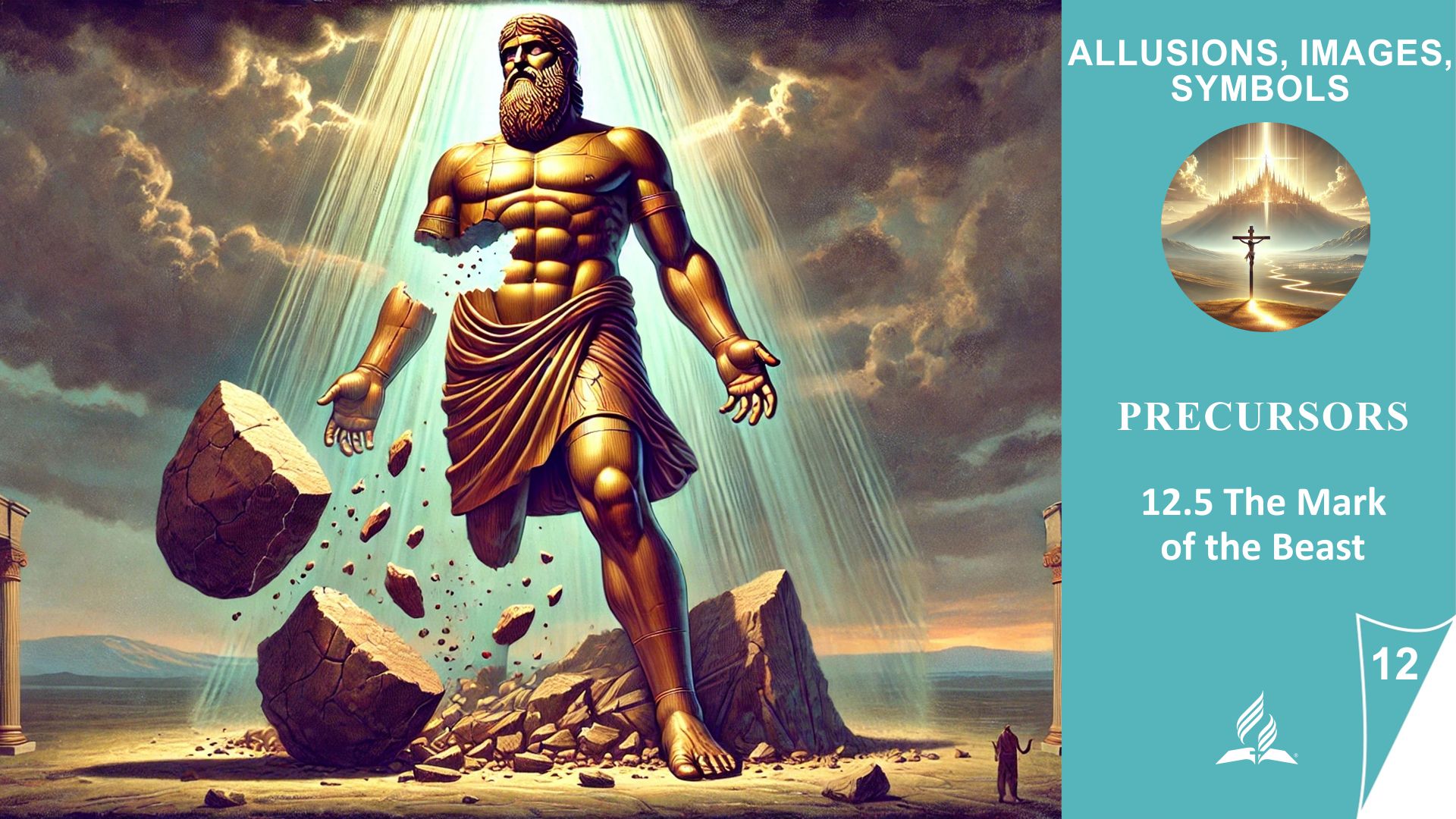


⛪ Lesson 12: Precursors
📘 12.5 The Mark of the Beast
✨ The Mark – A Choice Between God’s Faithfulness and Human Authority
…………………………………………………………………
🟦 Introduction – Worship, Law, and the Final Decision
The mark of the beast—a topic often debated, misunderstood, or dismissed. For many, it sounds like religious fantasy, a relic of ancient apocalyptic visions. Yet the Bible—especially the book of Revelation—is remarkably clear: At the end of time, the ultimate issue will not merely be about politics, economics, or environmental policy, but about a single decisive question:
Who receives my worship—God the Creator, or a power that usurps His place?
This question is not only decided in the heart but demonstrated through visible, public loyalty—within a context of coercion, deception, and pressure.
………………………………………………………………….
📖 Bible Study – A Deeper Look at Matthew 12 and John 5
🧭 Matthew 12:9–14 – The Man with the Withered Hand
Jesus is in the synagogue. A man with a crippled hand is present. The Pharisees ask, “Is it lawful to heal on the Sabbath?”—not to learn, but to accuse.
Jesus replies with a parable: If someone has a sheep and it falls into a pit on the Sabbath—won’t he lift it out?
“How much more valuable is a person than a sheep! Therefore it is lawful to do good on the Sabbath.” (v.12)
Then He heals the man—and immediately the plan to kill Jesus begins. Because He healed on the Sabbath.
🧭 John 5:1–16 – The Healing at the Pool of Bethesda
Jesus heals a man paralyzed for 38 years. It is the Sabbath. He tells him: “Get up, pick up your mat and walk.”
The religious leaders do not see the miracle—they see a violation. Why? Because the healed man is carrying his mat, an act that by human tradition was considered “work.”
Verse 16: “So, because Jesus was doing these things on the Sabbath, the Jewish leaders began to persecute Him.”
Verse 18: “For this reason they tried all the more to kill Him…”
🔍 What do we see here?
-
Jesus keeps the Sabbath, but not according to human tradition.
-
The religious authorities value their interpretation above God’s intention.
-
Jesus’ actions put Him in danger—because He lived the Sabbath correctly.
-
The conflict line is: Divine Law vs. Human Interpretation—a theme that continues through Revelation.
………………………………………………………………….
📖 Answers to the Questions
📌 Question 1: Read Matthew 12:9–14 and John 5:1–16. What issue led the religious leaders to want to kill Jesus?
📖 Biblical Observation:
In both texts, the Sabbath is at the heart of the conflict. Jesus performs a good, life-giving act—on the seventh-day Sabbath. But instead of celebrating the miracle, the religious leaders are enraged because He violated their traditions.
Matthew 12:14 says: “But the Pharisees went out and plotted how they might kill Jesus.”
John 5:16–18: “So the Jewish leaders began harassing Jesus… and tried all the more to kill Him… because He was even calling God His own Father, making Himself equal with God.”
📌 What was the real issue?
Not the Sabbath itself, but how Jesus treated it:
-
He healed, which they considered “work”
-
He broke their traditions, not God’s law
-
He challenged their authority
-
He revealed the true purpose of the Sabbath
They feared losing control. Religion had become a tool of their power, not a means to know God—and Jesus disrupted their system.
💡 Summary:
-
The issue that put Jesus’ life at risk was the Sabbath—or more precisely, His approach to it.
-
The conflict was not about God’s law, but man’s distortions of it.
📌 Question 2: Dying for one of God’s commandments? How easy is it to rationalize our way out of that?
✝️ Context:
Jesus Himself faced danger because of a commandment—the Sabbath.
In the end times, Revelation 13 and 14 show that a commandment of God will again become the test: the Sabbath.
Why? Because it is the only commandment that:
-
Directly points to God as Creator
-
Serves as a sign of loyalty (Ezekiel 20:12)
-
Can be publicly kept or broken
⚠️ How do people rationalize disobedience?
Human nature prefers the path of least resistance—especially when consequences include social exclusion, economic loss, or even death.
Common excuses might be:
-
“The Sabbath is symbolic—God knows my heart.”
-
“I keep Sunday for family reasons, not belief.”
-
“I’ll outwardly comply, but inwardly I’ll stay loyal.”
-
“Jesus freed us from the law—we live by grace.”
-
“God doesn’t want religion, He wants relationship.”
🚫 What’s the problem with such arguments?
They sound spiritual—but they bypass obedience.
Jesus said:
“If you love Me, keep My commandments.” (John 14:15)
“The Sabbath was made for man…” (Mark 2:27)
Keeping the Sabbath isn’t legalism—replacing or twisting it is.
📘 Parallel to Revelation:
-
The mark of the beast (Revelation 13) represents a human system that changes God’s law.
-
The faithful (Revelation 14:12) keep God’s commandments—not out of fear, but love.
A time will come when economic pressure, persecution, and isolation will target those who remain loyal to the biblical Sabbath.
And then the question will be:
Am I willing to lose everything for one of God’s commandments—or will I rationalize?
🧭 Spiritual Insight:
Just as Jesus was persecuted over the Sabbath, His faithful people will face the same.
“Whoever is faithful in little…” (Luke 16:10) will be faithful in much.
✅ Conclusion to Both Questions:
-
The Sabbath was the issue that led to plots to kill Jesus.
-
In the end time, it will again be the test of faith or compromise.
-
Excuses are easy—but faithfulness is costly.
Yet God honors faithfulness, not just religious talk.
………………………………………………………………….
✨ Spiritual Principles
-
God’s commandments remain—even under pressure.
-
Worship is an act, not just a feeling.
-
God seeks faithfulness, not convenience.
-
Compromise may be easier—but it never brings blessing.
-
The Sabbath is the seal of the Creator—the mark is its counterfeit.
………………………………………………………………….
🧩 Application for Daily Life
-
Train faithfulness now—not just when crisis hits.
-
Keep the Sabbath with joy and clarity—as a sign of belonging, not a burden.
-
Let Scripture, not culture, guide your decisions.
-
Stand for your faith—even if others mock you.
-
Prepare spiritually—through prayer, Bible study, and fasting.
………………………………………………………………….
✅ Conclusion
The final battle won’t be fought with weapons—but with truth vs. lies, loyalty vs. compromise.
And the central issue won’t be murder, adultery, or theft—but the Sabbath.
Why? Because it is the sign of loyalty—God’s commandment in a world ruled by human authority.
When pressure comes—will you stand?
………………………………………………………………….
💭 Thought of the Day
“God won’t need an army—just a few who would rather walk into the fire than bow.”
………………………………………………………………….
✍️ Illustration – “The Last Day – Jonas’ Decision”
Germany, Spring 2047.
Jonas stood at the window of his small apartment in Berlin-Mitte, looking out at the empty Alexanderplatz. A gray silence hung over the city. No tourists. No open shops. No market. Only the sound of drones patrolling the streets.
It was Sunday—legally protected.
Since the Global Climate Protection Act of 2045 came into effect, a worldwide mandatory rest day had been introduced: Sunday. Officially for “planetary recovery,” but Jonas knew better. The real reason was religious. Sunday rest was just a cover. What really lay beneath was worship—not of God’s order, but man’s.
Jonas was one of the few who refused to comply. No “Sunday prayer,” no wearing the new symbol on his forehead or hand—a subtle chip that controlled access to public life.
He was a Sabbath keeper. Still.
On Friday evening, as the biblical Sabbath began, it was like always: quiet, simple. No flashy service, no grand choir. Just him, an old Bible, candlelight, and his conviction.
“Remember the Sabbath day, to keep it holy…” (Exodus 20:8)
His father had once said,
“Son, a time will come when the Sabbath will be your most precious possession—and your most dangerous one.”
Jonas had laughed then.
Now he sometimes cried.
Saturday, 10:43 a.m.
His healthcare access was blocked. Bank account frozen. Metro scanner denied entry. A warning symbol flashed at every checkpoint:
“Refuser Tag A30.”
He knew what it meant: One more week until ‘Final Hearing.’
The government called it a religious verification interview. He called it interrogation.
He could no longer officially work. The small furniture shop built by his grandfather was shut down—“Violation of Rest Ritual Law §9/2046.”
Monday – the hearing.
He stood in the courtroom. In front of him: three officials, neutral faces, one wearing AR glasses tracking his biometrics.
“Mr. Jonas Berger,” said the chairman,
“You have seven days to comply with the Planetary Rest Regulation. A simple Sunday morning ritual will suffice. A small confirmation on your forehead or hand. No sermon required. Just show belonging.”
Jonas replied calmly:
“I do not belong to Babylon.”
“Excuse me?”
“I serve the Creator of heaven and earth—who rested on the seventh day. No other sign, no other law has the right to replace that.”
Silence.
The chairman gave a thin smile.
“You understand what this means?”
Jonas nodded.
“Yes. I know whom I belong to.”
Friday night. The final decision.
His apartment had been searched. His last Bible group broken up. The few friends he had left had distanced themselves—out of fear.
He stood once more at the window. Same gray city. But this time, he looked upward.
“Lord, you know I’m not special. I’m trembling. I’m afraid. I want to live. But I will not betray You. I won’t trade You for the applause of this world. If You lead me through the fire—please walk with me.”
He fell to his knees.
No choir. No applause.
Just a whisper:
“The Sabbath is Mine. And you are Mine.”
Saturday morning. 6:15 a.m.
Jonas was taken.
Drones accompanied him to the special center. The final decision awaited.
An officer asked one last time:
“Last chance: Do you accept the symbol of unity—or will you hold to the seventh day?”
Jonas looked him in the eye.
Then to the sky.
Then answered softly:
“I cannot trade my Creator. Not for safety. Not for comfort. Not even for my life.”
What happened next never made the news.
But among the faithful, a quiet phrase began to spread:
“One did not surrender.”
Jonas disappeared. No one knew where.
But the next Sabbath, in the window of an illegal house church in Leipzig, lay a handwritten note:
“I am free.
Not because I was spared—
But because I chose.Jesus has not forgotten me.
And I have not sold Him out.”— J.
💭 Closing Thought:
God isn’t looking for heroes.
He’s looking for hearts that remain—when everyone else walks away.
The Sabbath will be the test.
Not because it’s hard—but because it’s visible.
Compromise costs little.
Faithfulness costs everything.
But it brings life.




















